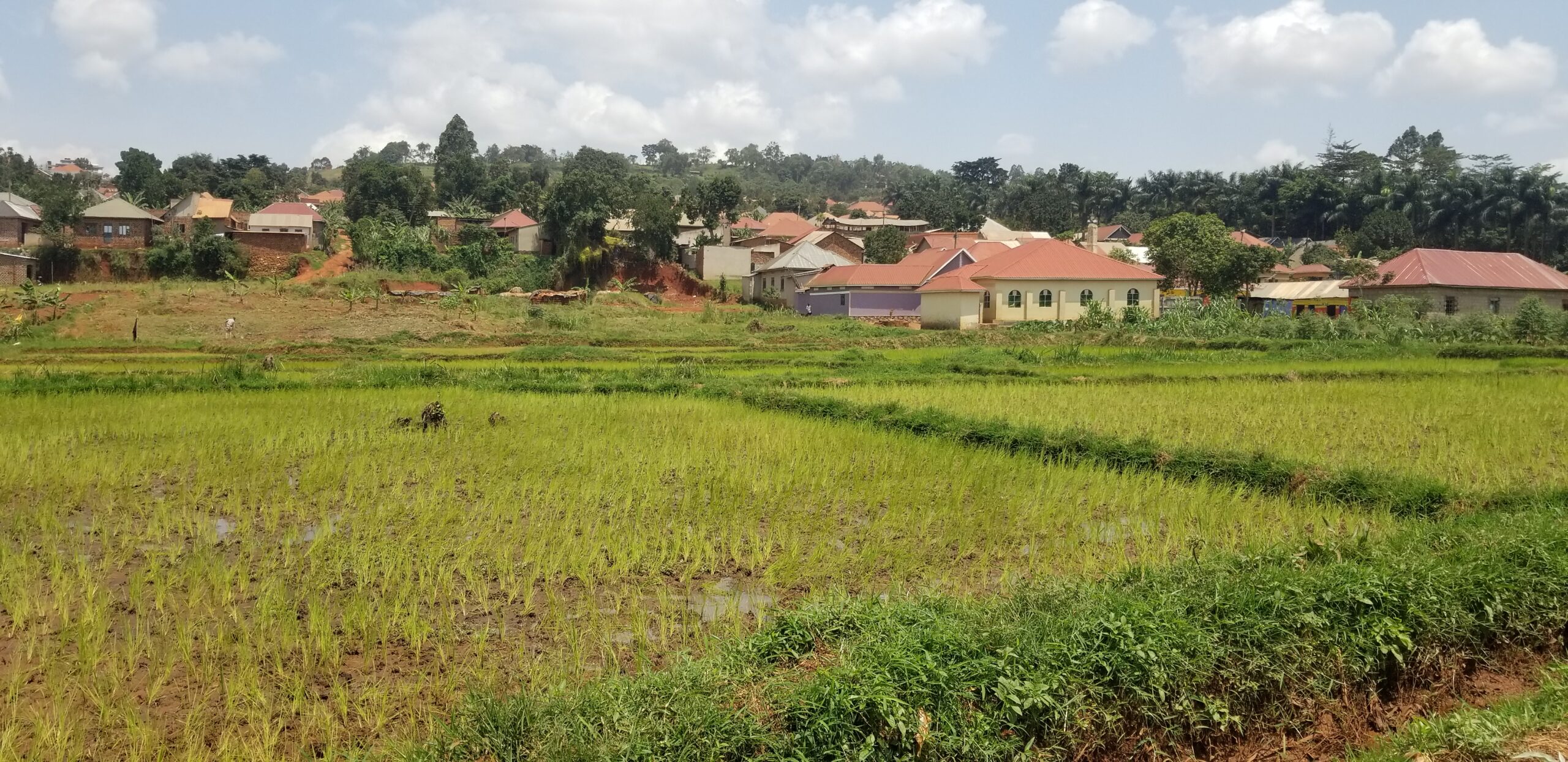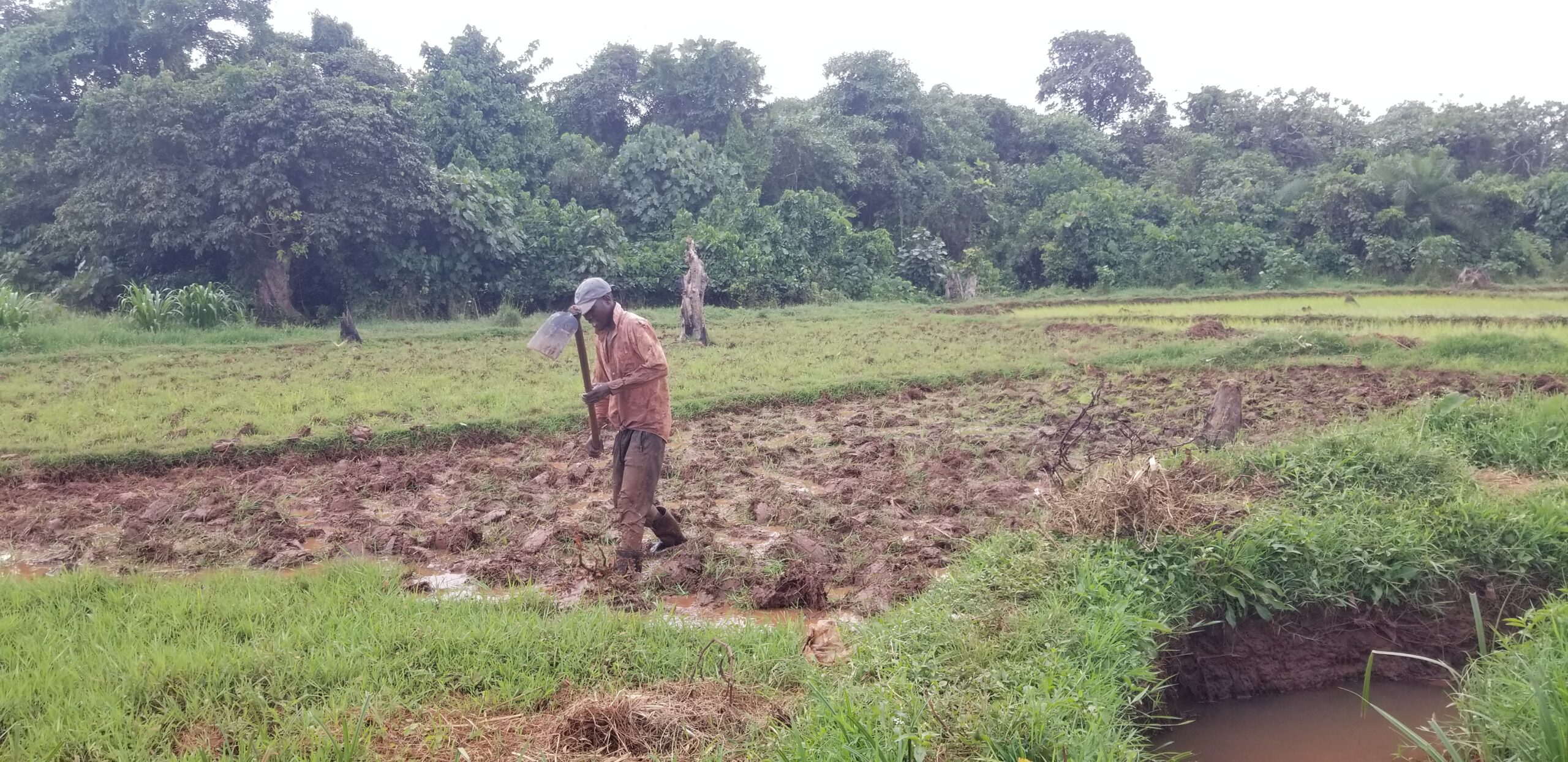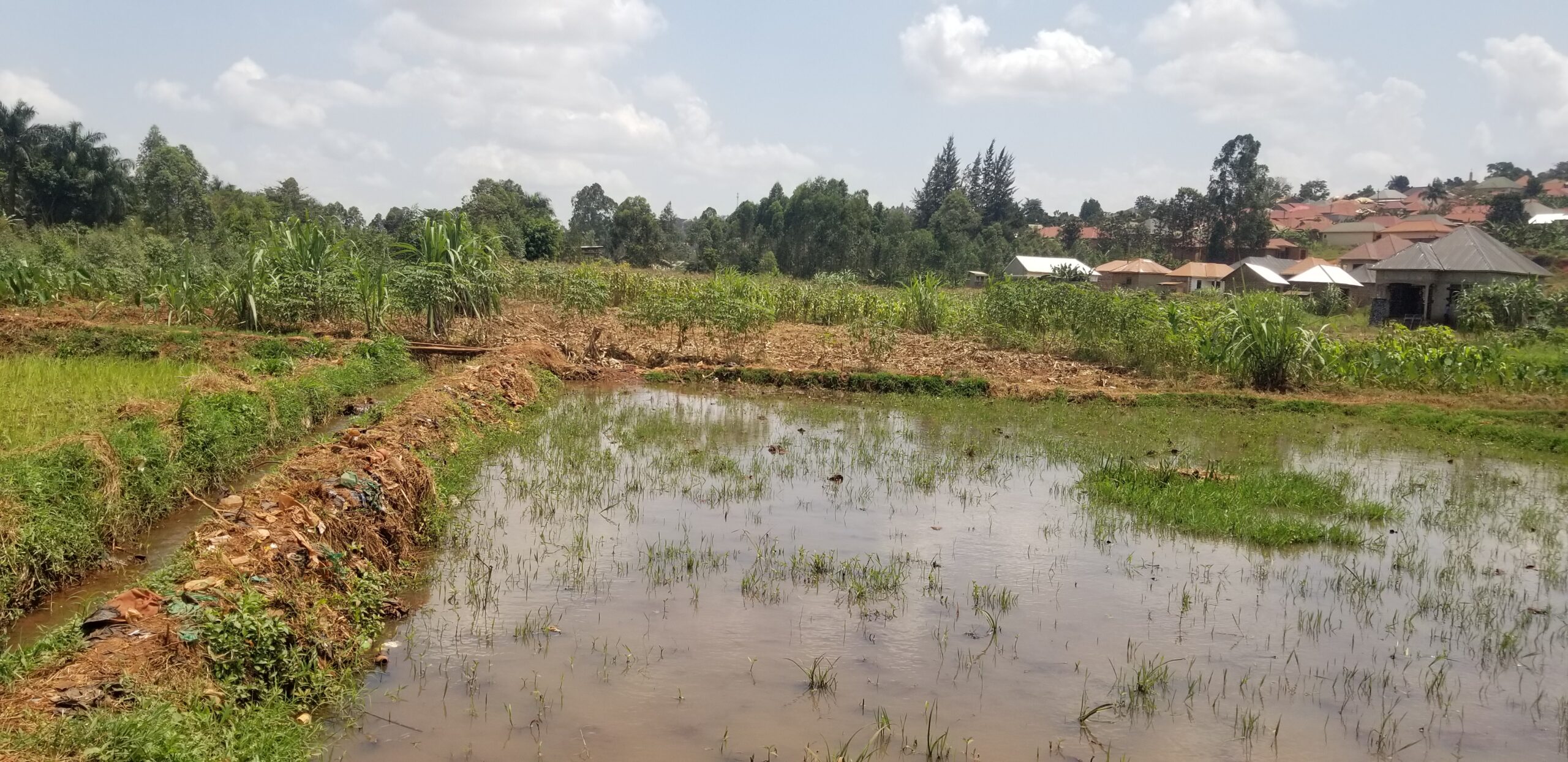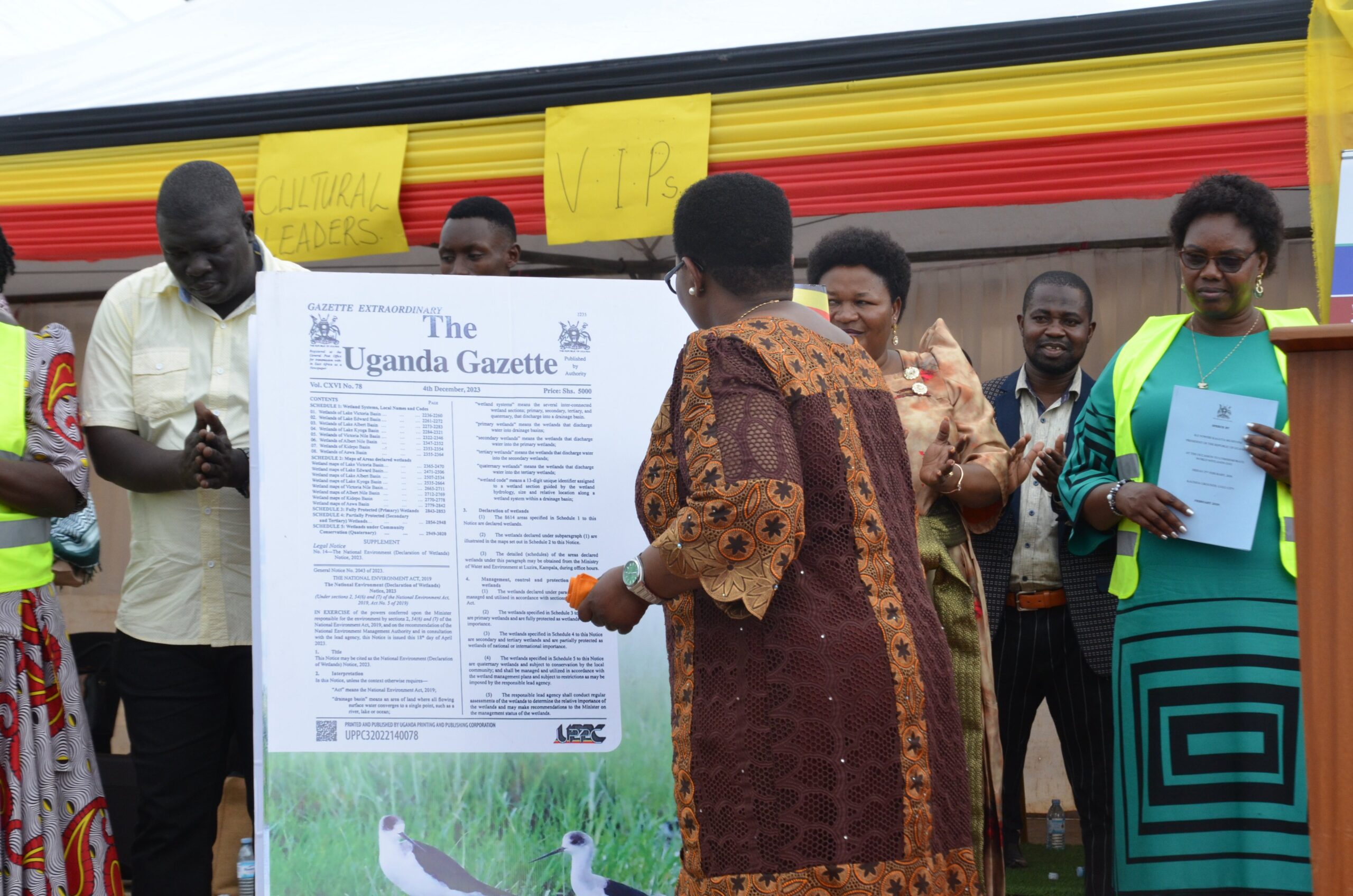By Waako Tonny | Victoria University Kampala
Over 64% of Uganda’s wetlands have been depleted or encroached upon. Despite the challenges, there are ongoing efforts to conserve the wetlands. On February 2, the Government officially gazetted all 8,613 wetlands in the country.
Encroachmen
Rice growing in swamps of Byambazi below | Photo by Waako Tonny 📸📸


Photos taken in Wakiso district in Kitemu show the extension of settlements & rice growing in wetlands along Kampala- Masaka road
The high degradation is attributed to the ever-increasing conversion of intact wetlands for subsistence cultivation of mainly rice, sugarcane and maize. The Kampala metropolitan basin wetlands have also been converted to farmlands,” the Nema report reads that also states that the major threat to wetlands in the Lake Victoria basin is the ever-increasing demand for land for urbanisation.
Other degraded wetlands include Victoria Nile (27 per cent), Albert Nile (20 per cent), Aswa (1 per cent) and Kidepo (1 per cent).“Each year, Uganda has been losing on average 791 square kilometres of its wetlands,” the report reads. There has been a sharp decline in wetland coverage from 15.5 per cent in 1994 to 13 per cent in 2017 and of the remaining wetlands, 4.1 per cent is degraded, according to the report. The report is based on field visits to places experiencing noticeable environmental changes and assessing relevant reports from different sectors and universities, according to Nema. Dr Tom Okurut, the executive director of Nema, said there was a slight improvement in the state of the national environment from 54 per cent in 2020 to 56 per cent this year.
Turn around bid
Dr Okurut said the improvements were due to the Covid-19 induced lockdown, which caused a reduction in air pollution by restricting the movement of motorised transport last year.“The floods also contributed to the improvement in the general state of the environment in the country by making people, who were residing in conservation areas, move away by themselves,” he said.
In the report, restricting the issuance of wetland use permits and certificates, demarcating and gazetting wetlands and increasing sensitisation of the public about the importance of wetland conservation were the key recommendations to curb loss of wetland cover.
The country representative of the World Wildlife Fund, Mr David Duli, asked the government to strengthen enforcement of laws to save the remaining wetlands in the country from depletion. “We are a country that relies on natural resources and we must conserve and add value to nature,” he said. The report also indicated that between 2011 and 2019, at least 4,487 hectares of wetland cover across the country were restored.
Research about encroachment on wetlands
National Statistics:
Uganda’s wetlands are facing alarming rates of degradation and loss, with stark statistics highlighting the urgency of conservation efforts. Since 1990, a staggering 30% of Uganda’s wetlands have been lost, primarily due to human activities such as agriculture, urbanization, and infrastructure development. In Kampala, the situation is even more dire, with 50% of the city’s wetlands converted into urban areas, including residential, commercial, and industrial developments. This rapid urbanization has compromised the city’s ecological integrity, exacerbating flooding, water pollution, and loss of biodiversity. Furthermore, Lake Victoria’s shoreline wetlands have suffered significant degradation, with 70% affected by human activities such as deforestation, agriculture, and fishing. This degradation threatens the lake’s water quality, fisheries, and livelihoods of communities dependent on these ecosystems. These statistics underscore the need for immediate action to protect Uganda’s remaining wetlands and restore degraded areas to ensure ecological resilience, water security, and sustainable development.
Regional Statistics
Uganda’s Central Region has witnessed significant wetland degradation, with 40% of its wetlands converted into agricultural land, according to the National Agricultural Research Organisation (2018). This alarming trend is exemplified by Nakivubo Wetland and Kinawataka Wetland, which have been extensively altered for crop cultivation. The conversion of wetlands into agricultural land has severe consequences, including loss of biodiversity, reduced water quality, and increased flood risk in urban areas like Kampala.
The Eastern Region faces a different challenge, with 30% of its wetlands affected by charcoal production, as reported by the National Forestry Authority (2020). Mbale Wetlands and Tororo Wetlands are notable examples, where large-scale charcoal production has led to widespread deforestation and habitat destruction. This activity compromises the ecological integrity of these wetlands, threatening water sources, soil quality, and local livelihoods. Charcoal production not only harms the environment but also perpetuates poverty and unsustainable land-use practices.
In the Western Region, urbanization has driven wetland degradation, with 25% of wetlands converted into urban areas, according to the Western Uganda Development Forum (2019). Fort Portal Wetlands and Kasese Wetlands are prime examples, where rapid urbanization and infrastructure development have encroached upon these ecosystems. This trend poses significant environmental risks, including increased flood risk, water pollution, and loss of biodiversity. The regional variations in wetland degradation highlight the need for targeted conservation efforts, addressing specific drivers of destruction and engaging local communities in sustainable management practices to protect Uganda’s remaining wetlands.
District Statistics
Kampala District has experienced severe wetland degradation, with 60% of its wetlands converted into urban areas, according to the Kampala Capital City Authority (2020). Notable examples include Nakivubo Wetland and Kinawataka Wetland, which have been extensively developed for residential, commercial, and industrial purposes. This rapid urbanization has compromised the ecological integrity of these wetlands, leading to increased flood risk, water pollution, and loss of biodiversity. The conversion of wetlands into urban areas also threatens the city’s water supply and sanitation infrastructure, exacerbating environmental and health concerns
Wakiso District has witnessed significant wetland degradation due to agricultural activities, with 40% of its wetlands converted into agricultural land, according to the Wakiso District Local Government (2020). The Lake Victoria shoreline wetlands are particularly affected, with crops such as rice, maize, and sugarcane being cultivated in these sensitive ecosystems. This conversion has led to soil erosion, water pollution, and loss of aquatic life, compromising the livelihoods of communities dependent on fishing and other wetland-based activities. Sustainable agricultural practices and conservation efforts are urgently needed to protect Wakiso’s remaining wetlands.
Mbale District has been impacted by charcoal production, with 35% of its wetlands affected, according to the Mbale District Local Government (2020). Mbale Wetlands are a prime example, where large-scale charcoal production has led to widespread deforestation and habitat destruction. This activity compromises the ecological integrity of these wetlands, threatening water sources, soil quality, and local livelihoods. Charcoal production also perpetuates poverty and unsustainable land-use practices, underscoring the need for alternative livelihoods and conservation initiatives to protect Mbale’s wetlands and promote sustainable development.
Specific Wetlands
Uganda’s wetlands have undergone significant degradation over the past three decades, with alarming consequences for the environment and local communities. Specific wetlands have been disproportionately affected, such as Nakivubo Wetland, where 70% has been converted into urban areas, and Kinawataka Wetland, where 50% has been lost to urbanization. Similarly, Lake Victoria Shoreline Wetlands have suffered 70% degradation, primarily due to agricultural activities, urbanization, and infrastructure development.
The data reveals a disturbing trend of wetland loss over the years. In 1990, wetlands covered 13.4% of Uganda’s land area, approximately 3.4 million hectares. However, by 2000, this had decreased to 11.6% (2.9 million hectares), and further declined to 9.5% (2.4 million hectares) by 2010. The most recent data shows that only 7.8% (2 million hectares) of Uganda’s land area remains as wetlands. Specific examples illustrate this decline: Nakivubo Wetland shrunk from 100 hectares to 50 hectares, Mbale’s wetlands decreased from 500 hectares to 300 hectares, and Jinja’s wetlands reduced from 200 hectares to 100 hectares
Mbale Wetlands, specifically, have been affected by charcoal production, with 40% of the wetland impacted, according to the National Forestry Authority (2020). Charcoal production has led to widespread deforestation and habitat destruction, compromising the ecological integrity of these wetlands. This activity not only harms the environment but also perpetuates poverty and unsustainable land-use practices.
The rapid loss of Uganda’s wetlands has severe consequences, including increased flood risk, water pollution, loss of biodiversity, and reduced livelihood opportunities for local communities. To reverse this trend, urgent action is needed to protect and restore Uganda’s remaining wetlands. This requires strengthened policy enforcement, community engagement, and sustainable land-use practices. By prioritizing wetland conservation, Uganda can mitigate environmental degradation, promote sustainable development, and ensure a resilient future for its ecosystems and communities.
Causes of Wetland Loss.

Wetland encroachment in disguise of cultivation picture by Waako Tonny 📸
Expansion (43%) is the leading cause of wetland loss, accounting for 43% of total wetland degradation. This is primarily driven by the increasing demand for food and agricultural products. Farmers seek to expand their land holdings to increase productivity, often encroaching on nearby wetlands. Activities such as rice farming, maize cultivation, and sugarcane production have led to widespread wetland conversion. For instance, the shoreline wetlands of Lake Victoria have been transformed into rice paddies, disrupting the natural water cycle and threatening.
In Uganda, the government’s emphasis on agricultural modernization and commercialization has led to increased pressure on wetlands. Large-scale farming operations, often backed by foreign investors, have resulted in widespread land acquisition and wetland clearance. This not only affects local ecosystems but also displaces communities that depend on wetlands for their livelihoods. The loss of wetlands due to agricultural expansion has severe consequences, including reduced water quality, increased soil erosion, and decreased fisheries.
Urbanization (26%) is another significant driver of wetland loss, responsible for 26% of total degradation. As cities expand, wetlands are often converted into residential areas, commercial centers, and infrastructure development projects. This process is particularly pronounced in Uganda’s urban centers, such as Kampala and Entebbe. The Kinawataka Wetland, once a vital habitat for aquatic life, has been largely converted into residential areas, shopping malls, and roads. Urbanization-driven wetland loss has severe environmental and social implications. Wetlands provide essential ecosystem services, including flood control, water filtration, and climate regulation. When these areas are destroyed, cities become more vulnerable to flooding, water pollution, and heat stress. Furthermore, the displacement of wetland-dependent communities can lead to social unrest, economic hardship, and cultural erosion.
Charcoal Production (15%) is a significant contributor to wetland loss, accounting for 15% of total degradation. In Uganda, charcoal is a primary source of energy for cooking and heating. However, the production process involves clearing wetland vegetation, often using unsustainable harvesting methods. Mbale’s wetlands, for example, have been extensively cleared for charcoal production, leading to widespread deforestation and soil degradation. Charcoal production in wetlands has devastating environmental consequences. Wetlands provide critical habitat for biodiversity, regulate water cycles, and mitigate climate change. When these areas are cleared, ecosystems become fragile, and biodiversity declines. Moreover, charcoal production contributes to greenhouse gas emissions, exacerbating climate change.
Livestock Grazing (8%) is another factor contributing to wetland loss, responsible for 8% of total degradation. Overgrazing in wetlands leads to soil compaction, reduced vegetation cover, and increased erosion. In Karamoja, a region in northeastern Uganda, overgrazing has transformed wetlands into barren landscapes, threatening the livelihoods of pastoralist communities. Uncontrolled livestock grazing in wetlands has severe environmental and social implications. Wetlands provide essential ecosystem services, including water filtration, flood control, and biodiversity conservation. When these areas are degraded, water quality declines, and pastoralist communities face reduced livestock productivity, economic hardship, and food insecurity.
Wetland Evasion Consequences
Loss of Biodiversity (43%),The destruction of Uganda’s wetlands has led to a significant loss of biodiversity, with 43% of the country’s wildlife depending on these ecosystems. Wetlands provide critical habitats for various species, including hippopotamuses, crocodiles, and birds. The decline of hippopotamus populations in Lake Victoria is a stark example of this consequence. Hippopotamuses rely on wetlands for food, shelter, and breeding grounds, but habitat destruction and fragmentation have reduced their populations.
The loss of biodiversity in wetlands has far-reaching implications for ecosystem health and human well-being. Wetlands support complex food webs, and the decline of key species can trigger cascading effects throughout the ecosystem. Moreover, biodiversity loss undermines ecosystem resilience, making wetlands more vulnerable to climate change, invasive species, and other disturbances.
Wetlands are vital sources of freshwater, with 75% of Uganda’s water originating from these ecosystems. However, wetland degradation has led to significant water pollution. The pollution of Lake Victoria’s water is a prime example, with agricultural runoff, sewage, and industrial effluent contaminating the lake. This has severe consequences for human health, aquatic life, and the economy.
Water pollution in wetlands has multiple sources, including agricultural chemicals, domestic waste, and industrial activities. When wetlands are destroyed or degraded, their natural filtration functions are compromised, allowing pollutants to enter water bodies. This can lead to eutrophication, harmful algal blooms, and decreased water quality. In Uganda, water pollution from wetland degradation affects not only human consumption but also agriculture, fisheries, and tourism.
Wetland degradation has resulted in a 30% increase in soil erosion, particularly in areas like Karamoja’s wetlands. Wetlands help regulate water flows, preventing soil erosion and landslides. However, when vegetation is cleared or degraded, soil becomes exposed and vulnerable to erosion.
Soil erosion has severe environmental and economic implications. It reduces fertility, decreases agricultural productivity, and increases sedimentation in water bodies. In Karamoja, soil erosion has transformed wetlands into barren landscapes, threatening pastoralist livelihoods and food security.
The destruction of Uganda’s wetlands has led to a 20% decrease in water table recharge. Wetlands play a crucial role in recharging groundwater aquifers, which supply water to communities, agriculture, and industry. Decreased groundwater levels in Kampala exemplify this consequence.
Reduced water table recharge has far-reaching consequences for water security and economic development in Uganda. Decreased groundwater levels, resulting from wetland degradation, exacerbate water scarcity, affecting households, agriculture, and industry. This leads to reduced agricultural productivity, with lower crop yields, reduced livestock productivity, and decreased farm incomes, ultimately increasing food insecurity and poverty. Additionally, pumping water becomes more energy-intensive, increasing costs for irrigation, drinking water supply, and industrial processes, eroding profit margins and reducing competitiveness. Industrial productivity also declines, compromising economic growth, employment, and foreign exchange earnings. To mitigate these impacts, preserving wetlands and promoting sustainable water management practices are critical to ensuring water availability, agricultural productivity, energy efficiency, and industrial competitiveness, ultimately safeguarding Uganda’s economic future and promoting sustainable development.
Government Initiatives and Policies
The National Environment Act (2019) is a landmark legislation that provides a framework for environmental management in Uganda. This Act established the National Environment Management Authority (NEMA), which is responsible for coordinating and overseeing environmental conservation efforts nationwide. NEMA plays a crucial role in implementing policies and programs aimed at protecting Uganda’s natural resources, including wetlands. The Act empowers NEMA to regulate activities that impact the environment, enforce environmental standards, and promote sustainable development. By establishing NEMA, the government has demonstrated its commitment to environmental protection and sustainable development, ensuring that Uganda’s natural resources are managed in a way that benefits both present and future generations.
Uganda’s Wetlands Management Policy (2013) provides guidelines for the conservation and management of wetlands, recognizing the vital role these ecosystems play in supporting biodiversity, water resources, and livelihoods. The policy aims to conserve and protect wetland ecosystems, promote sustainable use of wetland resources, enhance community participation in wetland management, and strengthen institutional capacity for wetland conservation. This policy provides a framework for integrating wetland management into national development plans, ensuring that wetlands are protected and utilized in a sustainable manner. By adopting this policy, the government acknowledges the importance of wetlands to Uganda’s ecological and economic well-being, and sets the stage for effective management and conservation of these critical ecosystems.
The National Wetlands Conservation and Management Strategy (2015-2025) outlines Uganda’s vision for wetland conservation and management, focusing on community-based wetland management. This strategy recognizes the critical role local communities play in wetland conservation and aims to protect and restore wetland ecosystems, promote sustainable livelihoods and economic benefits, enhance community engagement and participation, and strengthen institutional capacity and coordination. The strategy provides a roadmap for achieving these objectives through collaborative efforts among government agencies, local communities, civil society organizations, and private sector stakeholders. By prioritizing community-based management, Uganda’s government acknowledges the importance of local knowledge and skills in managing wetlands sustainably, ensuring that conservation efforts benefit both people and the environment.
Community-based wetland management is a cornerstone of Uganda’s wetland conservation efforts, recognizing that local communities have traditional knowledge and skills essential for managing wetlands sustainably. This approach empowers local communities to take ownership of wetland conservation, building capacity for sustainable wetland management and promoting livelihoods that depend on wetland resources. Community-based management fosters collaboration among stakeholders, ensuring that conservation efforts are effective, sustainable, and equitable. By engaging local communities in wetland management, Uganda aims to ensure that conservation efforts benefit both people and the environment, promoting sustainable development and environmental conservation for future generations. This approach acknowledges the intricate relationship between local communities and wetland ecosystems, ensuring that conservation efforts are grounded in local context and knowledge.
Challenges and Recommendations
Challenges.
The National Forestry Authority (February 20, 2024), sounded an alarm on the urgent need to address climate change and human activities threatening Uganda’s wetlands. This warning emphasizes the critical role wetlands play in mitigating climate change impacts, such as flooding and drought. Human activities like deforestation, agriculture, and urbanization exacerbate these threats.
Ministry of Water and Environment (March 5, 2024), The Ministry stressed the vital importance of wetlands for Uganda’s water security. Wetlands help regulate water flows, filter pollutants, and maintain groundwater recharge. Losing these ecosystems would compromise Uganda’s water supply, affecting agriculture, industry, and human consumption.
Uganda Wildlife Authority (April 10, 2024), The Uganda Wildlife Authority reported continued encroachment on wetlands by human settlements, highlighting the ongoing struggle to balance human needs with environmental conservation. Encroachment leads to habitat destruction, displacement of wildlife, and loss of ecosystem services
Environmental Alert (May 5, 2024), warned of the devastating impact of pollution on wetlands ecosystems. Pollution from agricultural runoff, industrial waste, and domestic sewage harms aquatic life, contaminates water sources, and undermines ecosystem resilience.
Uganda’s wetland conservation efforts are hindered by the limited enforcement of regulations. Despite having laws and policies in place, the government struggles to effectively implement and enforce them, particularly in urban areas like Kampala. The lack of enforcement in Kampala’s wetlands has led to widespread encroachment, degradation, and destruction of these ecosystems. Wetlands are being converted into residential areas, commercial centers, and industrial sites, compromising their ecological integrity. The absence of effective enforcement mechanisms enables perpetrators to act with impunity, undermining conservation efforts.
Wetland conservation in Uganda faces significant funding constraints. The government and other stakeholders allocate insufficient resources to support conservation initiatives, research, and community engagement. Limited funding hampers efforts to protect and restore wetlands, leading to degradation and loss of biodiversity. Insufficient resources also limit the capacity of conservation agencies, community groups, and local authorities to effectively manage and protect wetlands. This funding gap undermines Uganda’s ability to achieve its wetland conservation goals, compromising the long-term sustainability of these ecosystems.
A critical challenge facing wetland conservation in Uganda is the limited awareness among local communities. Many communities surrounding wetlands are unaware of the importance of these ecosystems and the benefits they provide. This lack of awareness leads to unsustainable practices, such as overfishing, overgrazing, and wetland encroachment. Local communities often view wetlands as wastelands or sources of fuelwood and other resources, rather than recognizing their role in regulating water cycles, supporting biodiversity, and mitigating climate change. Raising awareness among local communities is essential to promoting community-based wetland management and ensuring the long-term conservation of these ecosystems.
Recommendations
To effectively conserve Uganda’s wetlands, it is essential to strengthen the regulatory framework by reviewing and updating existing wetland policies. This involves revising laws, regulations, and guidelines to reflect current environmental concerns and international best practices. Updated policies will provide clarity and guidance for stakeholders, ensuring consistent enforcement and effective management of wetlands. A robust regulatory framework will also empower authorities to prevent wetland degradation, hold perpetrators accountable, and promote sustainable use of wetland resources. By strengthening the regulatory framework, Uganda can ensure that wetland conservation is integrated into national development plans, safeguarding these ecosystems for future generations.
Community engagement and education are critical components of successful wetland conservation. Increasing community involvement in wetland management will promote ownership, responsibility, and sustainable practices. Education programs should focus on raising awareness about the importance of wetlands, their benefits, and the consequences of degradation. Community-based wetland management approaches will empower local communities to manage wetlands sustainably, balancing livelihood needs with conservation goals. This can be achieved through workshops, training programs, and collaborative decision-making processes. By engaging local communities, Uganda can leverage traditional knowledge and skills to conserve wetlands, ensuring that conservation efforts benefit both people and the environment.
Providing alternative livelihoods support and promoting sustainable agriculture practices are crucial for reducing pressure on Uganda’s wetlands. Many communities rely on wetlands for livelihoods, often using unsustainable practices that degrade these ecosystems. Alternative livelihoods support, such as ecotourism, aquaculture, and sustainable agriculture, can reduce dependence on wetland resources. Sustainable agriculture practices, like agroforestry and permaculture, can increase crop yields while minimizing environmental impact. By providing training, resources, and market access, Uganda can empower communities to adopt sustainable livelihoods, reducing wetland degradation and promoting conservation. This approach will also improve community well-being, increase food security, and enhance ecosystem resilience.
The government is so alert with measures to curb encroachment on wetlands
Ugandan government officials have emphasized the importance of protecting the country’s wetlands. President Yoweri Museveni stressed that wetlands are crucial for Uganda’s economy and environment, and urged protection for future generations [source: State House Uganda, Twitter, February 2, 2023]. Similarly, Flavia Munaaba, Permanent Secretary of the Ministry of Water and Environment, highlighted the alarming loss of over 30% of Uganda’s wetlands in the last decade, calling for immediate action to reverse this trend [source: Daily Monitor, June 5, 2023).
President Museveni’s commitment to environmental conservation is reflected in his broader policies. Under his leadership, Uganda has made significant progress in various sectors, including economy, health, education, and infrastructure . Museveni has also been recognized for his efforts in promoting regional peace and stability, and has received several awards for his leadership and contribution to African unity
In his recent State of the Nation address of 2024, President Museveni outlined Uganda’s progress and future plans, emphasizing the importance of regional and global cooperation While his administration’s environmental policies have shown promise, the challenge of protecting Uganda’s wetlands requires sustained effort and collaboration among government agencies, local communities, and international partners. https://thesource.co.ug/national/full-speech-president-musevenis-state-of-nation-address/
Uganda Commits To Protecting Wetlands

Picture courtesy: February 23, 2024; Hon. Justine Kasule Lumumba who represented the President, officially launches the Uganda Gazette on wetlands during World Wetlands Day 2024 in Gulu
The Government of Uganda has officially gazetted all wetlands in the country, recognizing their critical role in protecting communities from climate change and providing essential benefits for millions. This landmark decision is aligned to the Ramsar Convention and comes after years of collaboration between the Government, the United Nations Development Programme (UNDP) and partners on restoration of wetlands and associated catchments.
The Uganda Gazette on wetlands, officially titled “The National Environment (Declaration of Wetlands) Notice, 2023”, is a legal document issued by the Government of Uganda in September 2023. This notice was officially launched on World Wetlands Day 2024 and serves as a crucial step toward wetland protection in the country through:
Declaring all 8,613 wetlands in Uganda officially protected: This means that these wetlands are now legally recognized as critical ecosystems and any activities like encroachment, drainage, or pollution within them are prohibited.
The notice includes the names, locations, maps with boundaries, and total area coverage of each wetland. This transparency enhances awareness and facilitates enforcement of protection measures.
The gazette provides a legal basis for the government to act against wetland degradation and promote sustainable management practices. This could involve activities like restoration, education, and regulation of permitted activities.
By protecting wetlands, Uganda enhances its ability to cope with climate change impacts like floods and droughts. Wetlands also provide vital services like water purification, flood control, and habitat for biodiversity, ultimately benefiting communities living near them.
On behalf of the President of the Republic of Uganda, H.E Yoweri Kaguta Museveni, during the World Wetlands Day 2024 celebrations in Gulu, Hon. Kasule Lumumba who is the Minister for General Duties and focal point minister for the Sustainable Development Goals (SDGs) called upon all leaders at all levels in the country especially the local councils to wake up and protect all wetlands.
“Wetlands deliver a wide range of ecosystem services that contribute to human well-being, such as fish, fiber, water supply, water purification, climate regulation, flood regulation and recreational opportunities, and increasingly tourism,” she added.
Wetlands encroachment is handled seriously by the government of Uganda to make sure that its is eliminated inorder to Curb its outcome but also the calprites remain unturned, would the long run assessments be positive or negative eyes open to tell a story .

Authored By Waako Tonny | Victoria University Kampala. SMS +256 770 667 909.

